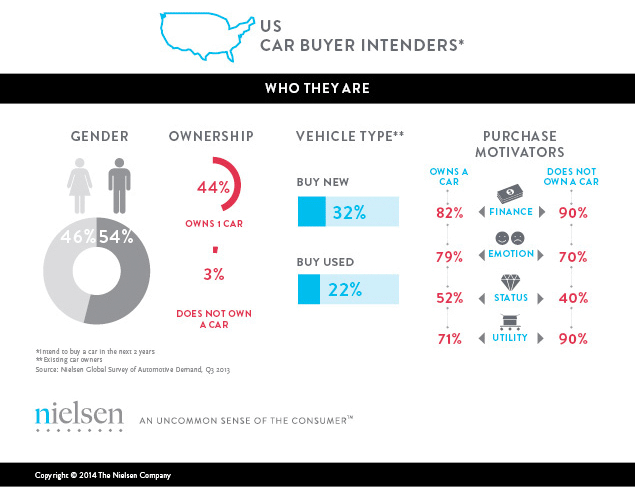Global Automotive Demand: Spotlight on the U.S. [REPORT]
May 10, 2014
![]() As demand for cars rapidly spreads in developing countries, it remains strong in established markets as well. In the U.S., where cars are an integral part of many consumers’ daily lives, obtaining a driver’s license is the initial step toward independence, and a first-car-purchase is often synonymous with pride and freedom. So who are the car buyers of tomorrow, where do they live, and what drives them through the path to purchase? To find out, Nielsen polled more than 30,000 Internet respondents in 60 countries. Here, we shine a spotlight on car buyer intent in the U.S.
As demand for cars rapidly spreads in developing countries, it remains strong in established markets as well. In the U.S., where cars are an integral part of many consumers’ daily lives, obtaining a driver’s license is the initial step toward independence, and a first-car-purchase is often synonymous with pride and freedom. So who are the car buyers of tomorrow, where do they live, and what drives them through the path to purchase? To find out, Nielsen polled more than 30,000 Internet respondents in 60 countries. Here, we shine a spotlight on car buyer intent in the U.S.
Men and Women Are Both in the Buyer’s Market
Among U.S. respondents who plan to purchase a car in the next two years, 46 percent are female and 54 percent are male, producing a fairly even split by gender. With only 3 percent indicating they do not currently own a car, the vast majority will be adding a second, third or perhaps even a fourth car to the mix. Among them, 32 percent plan to buy new, compared with 22 percent who will shop for used.
Emotion—the love of driving—is the most influential purchase motivator for existing car owners, aside from financial considerations, (79%), followed by utilitarian motivations (71%) and status (52%). Among the small percentage of respondents who do not already own a car, 90 percent say they are motivated by finance or utility, while emotion (70%) and status (40%) were less influential factors.
By paying close attention to the needs and desires of potential car buyers, automakers can better position themselves in a competitive marketplace. Similar country snapshots for India, Brazil, China, Russia, Mexico, Indonesia, Turkey and Germany can be found in Nielsen’s Global Automotive Demand Report.
file
Other findings include:
- Insight into who potential car buyers are, where they live, and how to appeal to them.
- Global trends in auto alternatives.
- Quick-reference country scorecards for: India, Brazil, China, Russia, Mexico, Indonesia, Turkey and Germany.
To download report CLICK HERE.































